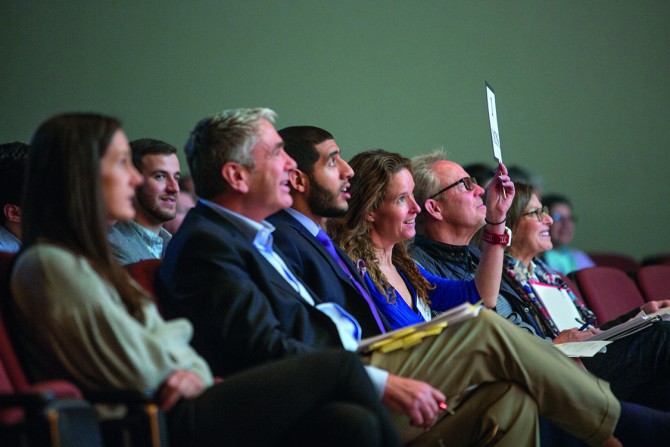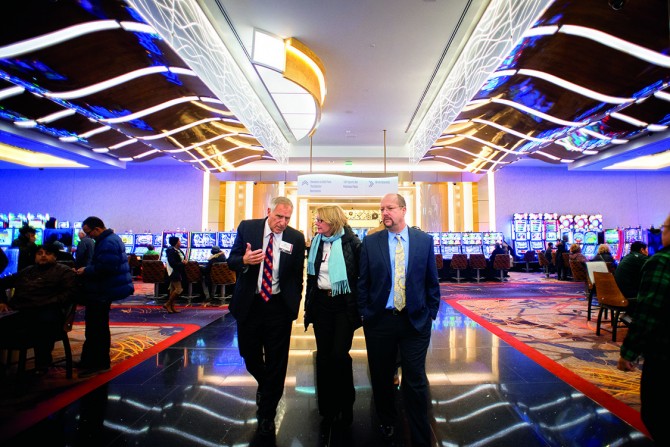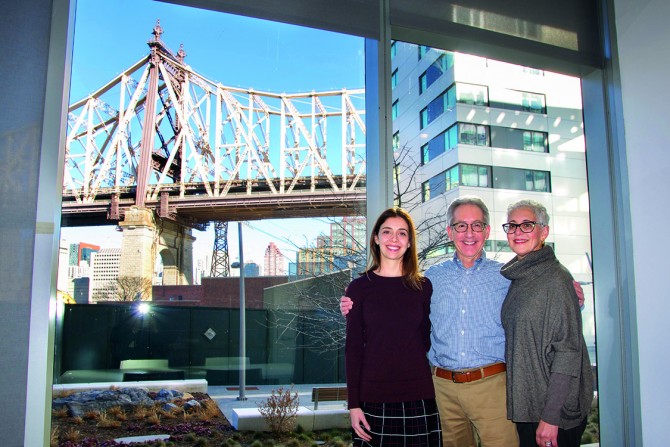
Challenge inspires gifts to the Cornell SC Johnson College of Business
By Kate Klein
In January 2017, a $150 million gift from H. Fisk Johnson ’79, M.Eng. ’80, M.S. ’82, MBA ’84, Ph.D. ’86, and SC Johnson named the Cornell SC Johnson College of Business. Johnson and his company designated a third of this gift – $50 million – as a challenge grant to leverage philanthropic support from others on a 1:3 basis, allowing the college to raise an additional $150 million in endowment and bring the total potential impact of the gift to $300 million.
“Fisk Johnson had a very strong commitment to helping each of the three schools in the college by making the challenge part of his gift,” said Jon Denison, associate dean for alumni affairs and development at Cornell SC Johnson.
In the year since, more than 50 donors have responded to the SC Johnson Challenge.
Leading the way
The first donor to respond to the SC Johnson Challenge is a familiar name in Cornell business education: John Dyson ’65, who, along with his brothers, Robert Dyson, MBA ’74, and Peter Dyson, named the Charles H. Dyson School of Applied Economics and Management in 2010. Dyson and his wife, Kathe, named the Peter L. Dyson Professorship of Ethics in Organizations and Life in memory of his brother.
“We named a professorship for Peter Dyson in ethics because it symbolizes the way Peter lived his life with the highest business and personal standards,” said John Dyson. “It is also a field that needs new emphasis in the current world, where lack of high ethical standards has led to a number of shocking mistakes in finance, personal behavior and business ethics. We hope that ethics and ethical behavior will take its proper place in the education of business leaders and, more generally, all Cornell students.”
To help keep Cornell SC Johnson faculty members – particularly those focused on hospitality – at the forefront of their discipline, Dharmendra “D.J.” Rama, MMH ’96, and his family leveraged challenge dollars to endow a faculty immersion program that has taken faculty members on a hotel tour in Washington, D.C., and a food and beverage trip in New York City.
“It’s building a bridge between faculty and the industry,” said Rama, president and CEO of his family’s company, Auro Hotels. “The hospitality industry is moving at a faster pace than the books you could produce, so it is important that the faculty see the trends.”
Expanding student experience
Many gifts in response to the challenge benefit students through scholarship endowments and endowments focused on enhancing the student experience.
Paul “Spike” Gerwin ’51, MBA ’52, had such a formative experience at Cornell – as a celebrated athlete and top-of-his-class scholar – that his wife, Marie Gerwin, endowed a scholarship at Johnson in his memory.
“He so loved his years at Cornell and was grateful for all Cornell offered him to succeed,” she said. Gerwin was so impressed with the first recipient of this scholarship, a first-generation college student from West Virginia, that she endowed a second scholarship in the College of Arts and Sciences in response to a universitywide scholarship challenge, another of several recent fundraising challenges launched in the past two years.
Sandy Solmon, founder and CEO of Sweet Street Desserts and a Cornell parent, also gave to enhance students’ business school experiences by establishing the Sweet Street Endowment for the Pillsbury Institute of Hospitality Entrepreneurship in support of an annual business plan competition, for which she serves as a judge.
“I believe in the distinctiveness of the Hotel School,” she said. “I hope it retains that unique character with the changes and innovations the Cornell SC Johnson College of Business provides. I’m doing my part to support the things that are distinctive and unique.”
Innovative programs, innovative spaces
Two gifts to the challenge provide flexible resources for innovation and space for that innovation to grow.
The challenge inspired Jay Shah ’90 to create the Hersha Center Endowment in the School of Hotel Administration, a dean’s discretionary fund named in honor of his parents, Hersha and Hasu Shah. Working closely with Hotel School Dean Kate Walsh, Shah hopes these funds will contribute to programs that further technology in the hospitality industry.
“The hospitality industry is all about delivering unique experiences. That’s what’s exciting about this particular room,” Shah said of the view overlooking Sage Hall from the Hersha Center, the experiential learning center on the top floor of Statler Hall named in recognition of the gift. With an industrial kitchen adjoining, the room is used as a student-run restaurant and for receptions and recruiting events.
Two-hundred and thirty miles away on Cornell Tech’s New York City campus, Mark Wurzel, president and CEO of candy company Calico Cottage, looks out the window of the Ellen and Mark Wurzel 1973, MBA ’74 Conference Room in the Tata Innovation Center. Their gift to name the room inside the building adds to an endowment fund for use by the dean for unrestricted purposes.
“We’ve long supported Johnson,” said Wurzel, the first to name a space inside the Samuel Curtis Johnson Graduate School of Management section of the Tata Innovation Center. “We like to get things started.”
Gifts inspired by the challenge total more than $30 million (as of mid-March) and have been matched by more than $10 million of the available $50 million 1:3 matching funds. “This challenge is a very real way to address priority needs while also growing the endowment,” Denison said.
Media Contact
Get Cornell news delivered right to your inbox.
Subscribe


